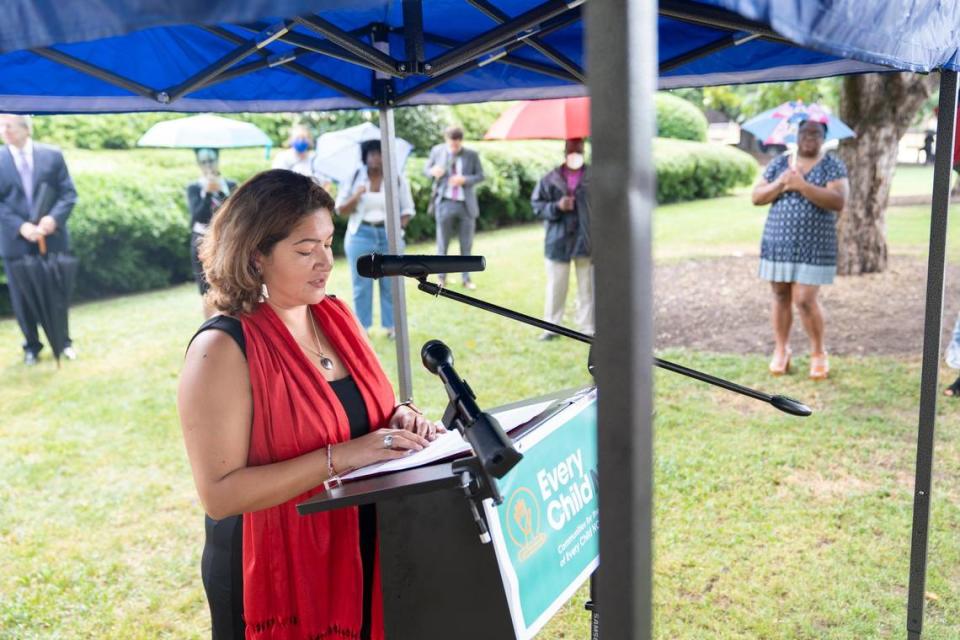‘The time is now’: School supporters say NC budget falls short of funding Leandro plan
Public school advocates say the proposed new state budget falls hundreds of millions of dollars short of a court-ordered plan for increasing funding to improve public education.
In April, a state judge issued a court order saying that North Carolina isn’t spending enough on public education, falling $785 million short of funding a plan developed by an education consultant.
At a rally Wednesday outside the Legislative Building, a coalition of public-education advocacy groups said the state Supreme Court should order the additional funding because lawmakers didn’t fully fund the Leandro plan in the new budget.
“The time is now to secure an order from the highest court in North Carolina requiring the General Assembly to do what it should have done 25 years ago and fully fund the Leandro decision,” said Brian Link, a member of the board of the North Carolina Association of Educators and an award-winning social studies teacher at East Chapel Hill High School.
But Republican legislative leaders say they’ve released a budget that increases education funding while still maintaining responsible spending levels in the face of a looming recession.
“This is a solid budget for the people of the State of North Carolina,” Senate leader Phil Berger said at a news conference Tuesday.

Sound basic education
At issue is the long-running Leandro school funding lawsuit that was initially filed in 1994 by low-wealth school districts to get more state funding.
Over the years, the state Supreme Court has ruled that the state Constitution guarantees every child “an opportunity to receive a sound basic education” and that the state was failing to meet that obligation.
In 2020, Superior Court Judge David Lee adopted a multi-year plan from California-based WestEd that’s designed to provide every student with access to a high-quality teacher and high-quality principal. The plan includes expansion of the state’s Pre-K program, more money for lower-wealth districts and higher pay for educators.
In November, Lee ordered the state to transfer $1.75 billion to fund the next two years of the Leandro plan. A state Court of Appeals panel blocked the order from being enforced.
Superior Court Judge Michael Robinson, who replaced Lee, ruled that last year’s state budget left the plan nearly $800 million short of being fully funded.
The state Supreme Court will hear oral arguments on the case in August, including whether the courts can order the additional funding.
“Our courts have found time and time again that the state has been failing to meet our students’ basic needs,” Iliana Santillan, executive director of El Pueblo, said at Wednesday’s rally. “All legislators have an oath to uphold the State Constitution, and that means implementing the Leandro plan so that all students have access to a sound basic education promised under the Constitution.”

‘A North Carolina budget’
Republican legislative leaders say they’ve provided significant investments into education, including:
▪ An average 4.2% raise this year for teachers.
▪ An average 4% raise or a minimum salary of $15 an hour for school support staff, whichever is higher.
▪ Raising the minimum starting salary for teachers to $37,000.
▪ A $70 million increase in the state fund to supplement teacher pay.
▪ Funding an additional 124 literacy coaches and early learning specialists to aid in early learning efforts.
▪ Increasing school safety funding to provide additional support to students in crisis and to hire more school resource officers.
Berger said they didn’t focus on the court-ordered plan when developing the budget. GOP lawmakers have argued in court that the judicial branch can’t require them to spend money for the plan.
“We looked at what the requirements are for funding public education in North Carolina and we appropriated dollars to do that,” Berger said. “How that matches up with what a non-profit from California determined was an appropriate amount, I couldn’t say.
“But this is a North Carolina budget adopted by North Carolina representatives and senators elected by the people of North Carolina.”
‘Time is now’
Supporters of the Leandro plan rallied in the rain outside the Legislative Building on Wednesday morning before going inside to lobby lawmakers.
Link, the NCAE leader, said lawmakers took “baby steps” in the budget to fund the Leandro plan. But Link said the budget will still leave North Carolina with the lowest starting teacher salary in the Southeast and with a salary $6,000 less than what teachers made in 2015 after inflation.
“We know that the Leandro funding for this year is still almost $800 million short,” Link said. “We know that, and what we know from what has been released over the last 12 hours to today is there is not $800 million of new funding that is going to public education that will make up that difference.”
Multiple speakers talked about how fully funding the Leandro plan would expand access to Pre-K programs. But advocates said many families can’t get access because childcare centers are unable to pay high enough salaries to teachers to staff classrooms.
“Every day that goes by a teacher leaves, there is a missed learning opportunity for a child and a parent can’t go to work or start her business,” said Gayle Headen, executive director of Wake County Smart Start. “Time is of the essence. The time is now.”

 Yahoo Movies
Yahoo Movies 
